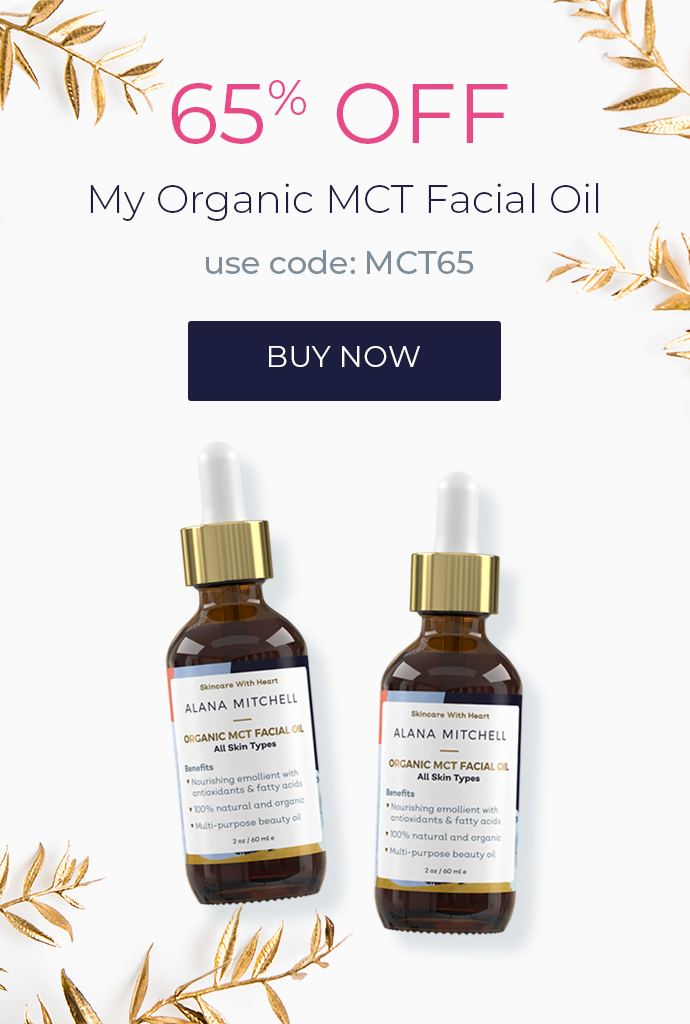What Should You Be Using In Your Skin Care Routine?
Take my quiz and get personalized recommendations from a
licensed esthetician!
These Amazing Skincare Benefits Prove Green Tea & Matcha Aren't Going ANYWHERE!
Chances are you've had a cup of hot or iced tea before.
It's a favorite of mine to sip on when I need a little pick-me-up!
Whether you're a fan or not, there's no denying that it's everywhere.

You may or may not be an avid tea drinker - but when's the last time your skin soaked some up?
If you’re lost, don’t worry.
I’m about to let you in on a little secret.
In particular, green tea is not only great for your stomach (hello, detox!), it’s also fab for your skin.
Same goes for matcha, the green beverage of the moment that’s been popping up everywhere - even in delicious baking recipes.
These two superstars have been climbing the trend ladder and gaining popularity in the beauty community for their ability to fight signs of aging, acne, and excess oil – but what’s the real deal with them?
Green tea for skin?!
Curious to know more? I’m about to give you all the details.
Caution: It’s hot!

Why Are Green Tea and Matcha So Magical?
We all know about superfoods, like broccoli and blueberries.
Well, if there were “super-drinks,” green tea and matcha would definitely fit in that category, trust me.
In fact, some sources still list green tea and matcha as superfoods, even though they’re technically beverages.
Unlike raw foods such as kale, you have to be more selective when choosing green tea products, because not all forms are pure.
Low-quality products can be mixed with rice, sugar, herbs, and other tea strains.
But, if you do get your hands on some straight-up green tea leaves or matcha powder, it’s all goodness.
In fact, matcha actually contains more disease-fighting antioxidants than superfoods like pomegranates and raspberries.
Unfortunately, the pure form of green tea doesn’t involve a Green Tea Frappuccino at your local Starbucks.
It'll more likely be a box of organic tea bags that runs for about $12 (crazy, I know).
But, regardless of the price, which isn’t much in the scheme of things, the benefits are wholly amazing – and super varied.
Some of the things that green tea and matcha can do for your body include the following:
- Combat aging
- Improve memory/can prevent Alzheimer’s
- Lower blood pressure
- Normalize blood sugar levels
- Promote bone health
- Keep you full longer
- Promote weight loss
- Protect vision and prevent eye disease
- Promote heart health
- Reduce inflammation
- Can increase muscle strength
- Boost energy levels
I'm sure you've heard of some of these before!
And did I mention that green tea has zero calories as long as you don’t add any sweetener?
This makes it an excellent substitute for sugary beverages, like soda.
Matcha also has a teeny-tiny amount of calories, if any.
The only thing you might want to watch out for is your hydration.
Green tea is a diuretic, which means that it will make you run to the restroom more often than usual.
So, if you’re drinking green tea, make sure you’re drinking lots of water too, which is something you should want to drink a lot of anyway!

Is There a Difference Between Green Tea and Matcha?
You may feel that the words “green tea” and “matcha” are used interchangeably, but they’re actually slightly different – although they both are green, taste heavenly, and are great for nearly every part of your body!
Both green tea and matcha are derived from the same plant, Camellia Sinensis (where black tea comes from, too), but that’s where their similarities mostly end.
You see, green tea is generally found in leaf form in a tea bag, or served as loose leaf tea to be used with a tea infuser.
It's also available pre-made in bottles and cans.
Matcha, on the other hand, is pure green tea leaves that have been ground into powder.
In fact, “matcha” quite literally means “ground” or “powdered tea.”
Because of this difference, matcha is much more concentrated (AKA lots of nutrients packed in a tiny tablespoon).
Experts estimate that matcha has 3x the antioxidants than regular green tea does, and the flavor is also slightly richer than that of green tea.
So, when it comes to the products you’re putting on your pretty face, something with matcha probably used the powder form, while one with green tea likely used the leaves.
Additionally, green tea and matcha are processed differently.
The green tea process involves quickly heating the leaves by pan-firing or steaming.
They can also be left out in the sun to wither.
Unlike black tea, the goal is to make sure the leaves don't oxidize.
Matcha, on the other hand, is specifically kept in the shade and away from the sun to increase chlorophyll and amino acid production.
This makes the leaves a darker green and increases the sweetness.
Then the leaves are laid out flat to dry and ground down to the powder.
Because of their impressive amount of nutrients and benefits, green tea and matcha are great additions to skincare products, and chances are you’ve probably noticed their popularity in the beauty aisle – especially as of late.

Why Am I Seeing Green Tea and Matcha Beauty Products Everywhere?
You might think that green tea and matcha are a new trend that’s come along with the organic, all-natural trend that many people are hopping on these days, but it’s not.
Well, not completely.
Green tea’s health benefits have been regarded for centuries, dating all the way back to Ancient China (where it originated) and Japanese Dynasties.
During the Tang dynasty, "The Classic of Tea," a groundbreaking book written by Lu Yu, was published.
It explored the importance of green tea in culture.
Also during this time, geishas performed formal tea ceremonies that involved a delicate preparation of matcha.
While green tea's use in skincare is slightly more recent, doctors have cited its beneficial properties for quite some time now.
In fact, many scientific studies have shown that a main component of green tea, the polyphenol EGCG (short for epigallocatechin gallate), has anti-inflammatory and anticancer properties that can help to prevent certain skin cancers.
Health is something that will never fade away!
Part of the reason that green tea and matcha skincare products have become popular in the West as of late is due to our recent obsession with Korean Beauty (K-Beauty).
You may have heard about the popular 10-step skincare routine, but another popular component of Eastern culture is their love for tea.
Take Okinawa, Japan, one of our world’s “Blue Zones” – otherwise known as a place where the inhabitants regularly live 100+ years.
Their secret?
Drinking green tea daily.
On top of that, many East Asian women use green tea on their face, whether that involves using rice water and green tea to get brighter skin, or simply a matcha-based overnight sheet mask.
Like most trendy ingredients “of the moment” – think pumpkin and charcoal – every company seems to want a piece of the frenzy.

What Can Green Tea Do for My Skin?
You're now well-versed in the benefits of green tea!
You know it can help your brain and your waistline, but what exactly can it do for your skin?
I’m glad you asked!
Here are some of the reasons why your skin should soak it up:
- Reduce Acne and Treat Rosacea. Drinking green tea can soothe your tummy, and using green tea products on your face can soothe your skin. Polyphenols, a molecule found in green tea, have been proven to reduce inflammation, promote healing, and fight certain types of bacteria.
- Prevent Premature Aging. The caffeine in green tea can help tighten the skin, and the polyphenols can also help to fight free radicals, which weaken skin’s elasticity.
- Shield From Harmful UV Rays. We all know daily SPF is important, right? While green tea won’t be able to replace your sunscreen, studies have shown that drinking green tea or applying it topically protects the skin from damaging UV rays.
- Even Out Your Skin Tone. While green tea probably won’t erase scarring or hyperpigmentation, it can help to even out subtle inconsistencies in your skin tone and clear it up.
- Fight Excess Oil Production. Instead of just absorbing excess oil, like many acne products do, green tea stops it at the source by reducing the production of sebum. It won’t dry your face out, and one study found a 70% reduction in sebum in participants who used a 3% green tea product for eight weeks. Wow!
- Combat Undereye Circles. You’ve probably seen green (or black) tea in eye creams before, and that’s because the caffeine is a beneficial ingredient in fighting under-eye puffiness, swelling, and dark circles. You could even pop a couple of tea bags in the fridge and then place them on your eyes!
If you're struggling with any of the conditions above, you should definitely try some green tea or matcha products.
It's their specialtea, after all. (See what I did there?)
If you’re looking to treat dark spots or any sort of scarring or pigmentation, green tea probably won’t be your savior, as it hasn’t been proven to have any skin-lightening properties.
As long as you’re not literally pouring a piping hot cup of green tea on your face (ouch!), good things will come – trust me.
Luckily, there are tons of products available for you to get your daily or weekly dose of green tea antioxidants and matcha magic, from matcha tinged face spritzes to green tea exfoliators.
And, if you’re loving what green tea does for your skin, you can also try using it in your hair and on your teeth!
Green tea has been shown to stimulate hair growth and fight dandruff, plus prevent cavities, gum disease, and fight bad breath.
Is there anything it can’t do?
Try DIY-ing a tea rinse for your hair or making a homemade mouthwash for your teeth, since the green tea and matcha trend hasn’t made its way into a ton of hair care and dental products just yet...although I have a feeling it will soon!

Are There Any Side Effects to Using Green Tea or Matcha Products?
Not sold on the idea of incorporating green tea into your skincare routine?
Wondering if matcha will help you with the specific skin issues you struggle with?
I’ve got you covered.
When used topically, green tea and matcha themselves don’t really have any side effects, as they’re all-natural.
That being said, just because something is trending doesn’t mean it’s right for you, your lifestyle, or more importantly, your skin!
The only issue you could potentially have is an allergy.
You also have to consider what else is in the product you’re using besides the green tea or matcha (unless of course, you’re DIY-ing something, which is always a great option if you have sensitive skin).
There are products out there that claim to have green tea, but really just have green dye and a green leaf graphic on the label, or a teeny-tiny bit of matcha that is overpowered by other ingredients.
Always check the label for other ingredients that you know might irritate your skin type or give you an allergic reaction.
My favorite rule?
Test a small sample of the new product on a teeny-tiny part of your skin, like on the back of your wrist or behind your ear.
That way, you’ll know if a product doesn’t mesh well with your skin type before slathering it all over your face.
I want you to be happy and healthy – and sometimes that means skipping out on a trend that doesn’t work for you.

Just How Popular Are Green Tea and Matcha Products?
A quick Google search will show you how many green tea and matcha skincare products are out there.
Want an idea of how popular they've become?
Search “green tea” on Sephora’s website and you’ll get 241 results.
For “matcha,” arguably the newer trend, there are only 14 results.
That being said, you should expect the number of matcha products to increase within the next year.
If you're looking to try some different products made with green tea, below are some that I sell on my website!
Check them out!
Product Roundup
Iluma by Image Skincare Intense Lightening Serum
 Eminence Organics Balancing Moisturizer Duo
Eminence Organics Balancing Moisturizer Duo
Rhonda Allison Beta Green Tea Cleanser
 June Jacobs Green Tea and Cucumber Toner
June Jacobs Green Tea and Cucumber Toner
Final Thoughts
In the beauty world, we have a fascination with everything new and are eager to try the latest and greatest products.
And hey, there's nothing wrong with that!
It's how you find things you love and can get excited about.
However, I believe that if you find an ingredient or product that works for you, it's OK to use it for as long as you want.
You don't have to phase out your favorite eye cream, for example, because it's been around for 20 years.
Green tea and matcha certainly aren’t new delicacies, and they won't be going anywhere.
From your teacup to your T-zone, they're chock full of benefits.
If you haven't already, I encourage you to try both - either in beverage form or in a skincare product!
If they're regulars in your skincare routine and you're seeing positive results, it's OK to stick with 'em!
Have you tried any green tea or matcha beauty products? What did you think of them? Let us know in the comments section!
Top Brands
New Brands

Recent Posts

Are You Taking the Right Steps to Care for Your Skin?
Take the Quiz
Skincare Secrets!
10-step guide for healthy, beautiful skin after kids.
100% privacy. I will never spam you!
















